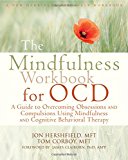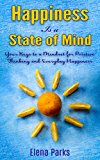The Mindfulness Workbook for OCD: A Guide to Overcoming Obsessions and Compulsions Using Mindfulness and Cognitive Behavioral Therapy (New Harbinger Self-Help Workbooks)
The Mindfulness Workbook for OCD: A Guide to Overcoming Obsessions and Compulsions Using Mindfulness and Cognitive Behavioral Therapy (New Harbinger Self-Help Workbooks)
If you have obsessive-compulsive disorder (OCD), you might have an irrational fear of being contaminated by germs, or obsessively double-check things. You may even feel like a prisoner, trapped with your intrusive thoughts. Despite the fact that OCD can have a devastating impact on a person’s life, getting real help can be a challenge. If you have tried medications without success, it might be time to explore further treatment options. You should know that mindfulness-based approaches have be
List Price: $ 21.95
Price:
SELF HELP: Happiness is a State of Mind (Your Keys to a Mindset for Postive Thinking and Everyday Happiness) (Inspirational Self Help Book)
Wouldn’t it be wonderful to live with greater peace even in times of stress? To be content in your daily life?
This book’s goal isn’t to eliminate the feeling of sadness or upsets from our lives, as that’s impossible. It is to help you have an improved outlook on life, to be able to see the silver lining in the clouds, to learn tools to help you be content and ok with where you are in life.
Can you change your negative thought process for a better you? I’ll give you the bad news first.
Price:





Highly beneficial synthesis of mindfulness, cognitive therapy and exposure,
Was this review helpful to you?







|Excellent workbook for clients with OCD,
The book begins with several chapters on mindfulness, followed by a very useful chapter entitled “Acceptance, Assessment, Action”, then there are nine chapters on applying their particular techniques to specific kinds of OCD, and finally a few chapters at the end on maintaining your progress and preventing relapse. I highly recommend this book to anybody who is suffering from any form of OCD, and, in fact, anyone suffering from other types of anxiety as well as I believe the
Was this review helpful to you?







|The new gold standard for OCD treatment,
As other reviewers have pointed out, mindfulness techniques that help you observe rather than react to OCD thoughts are becoming an important component in recovery. I feel an equally important point is the book’s emphasis on starting with gradual steps toward exposure. Classic exposure and response therapy (or ERP) was been described by at least one person who supports it as “the cruelest form of therapy,” and it reports a high dropout rate in the literature – conversely Hershfield’s gentle, positive and hopeful approach, undoubtedly borne of his own perspective as a recovering sufferer, will help open the doors of treatment for many more people. I highly recommend this book for anyone who suffers from OCD.
Was this review helpful to you?







|